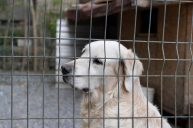Name something better than getting a puppy—we'll wait. Who wouldn't be thrilled to bring home a fluffy bundle of cuteness? The day that a new dog owner gets to pick up their puppy and bring them to their home is a day to remember forever. While it may be temping to rush off and get your new pup as soon as possible, keep in mind that they may not be ready to leave their mom just yet. It's crucial for puppies to spend time with their littermates and mother during the early stages of their lives, and taking a puppy home too early can have dire consequences.
So, when are puppies ready to go home safely? The answer is based on a couple of important factors.
When Puppies Are Ready to Go Home

Generally, puppies will be ready to go to their new homes somewhere between 8 to 12 weeks of age. It's important for new owners to leave their pup with its mom for as long as possible, and a puppy should never be separated from the litter too soon. A reputable breeder will keep puppies with their mother for at least 8 to 9 weeks, depending on the individual puppy and where they're headed next. The skills puppies learn during this time will help them adjust to their forever home better and make dog training easier down the road.
Benefits of Waiting to Bring Your Pup Home
Socialization
Early socialization starts at 6 weeks and continues through 12 to 14 weeks of age. During this time, the puppy learns how to interact with other people, environments, sounds, pets, and everything else that is now a part of their world. This time is a vital part of puppy development and has a lasting effect on how they interact, even as an adult dog. Think of this stage as a tutorial level for your pooch!
Vaccinations
A puppy cannot start their vaccinations until they are over five weeks old. Usually, the first round of vaccinations is performed between 6 and 8 weeks of age. After that, puppies get their first DHLPP vaccine around 10 to 12 weeks. Many breeders and rescues ensure pups have their first set of shots.
Weaning
Puppies should not go to their new family before weaning. Puppies start the transition from mother's milk to solid food between 3 and 5 weeks old, and the weaning process should not be rushed or interrupted. If a young puppy does not finish the process, it can lead to suckling when it is not necessary, as well as a host of behavioral problems in the future. Getting milk at the right age can also set your pup up for nutritional success, just like a human baby.
Learn Bite Inhibition
Bringing a pup home without proper bite inhibition can lead to training issues down the line, and it can possibly become an issue if you have children. Puppies learn basic impulse control and bite inhibition from their mother and littermates. If the pup does not spend enough time with their mom, they can have reactivity issues and become easily scared or aggressive.
Risks of Adopting a Puppy Too Young

RELATED: How to Know You're Finally Ready to Adopt a Puppy
Bringing home a puppy too young can lead to ongoing issues for new pet parents. Some of these problems can be fixed with proper training if they're related to behavior, while health concerns may be more difficult to address. Responsible dog breeders generally won't let dogs leave their moms too young, but they will take them back if there are any issues. On the other hand, pet stores generally will not take a pet back unless they work hand in hand with rescues.
Behavioral Problems
Pups that go to new homes around five weeks of age are more likely to develop behavioral problems. They can bite more than the typical puppy, suffer from anxiety and aggression, and may be more fearful of new situations. Thankfully, a good dog trainer can help new owners with many of these behaviors, but families with busy schedules or small children may feel overwhelmed by the issues.
Separation Anxiety
Puppies who leave their moms and siblings too soon can also develop separation anxiety. Usually, all dogs have a little anxiety the first time they are alone. However, pups who are well socialized and spend the right amount of time with their moms are better at adjusting to their new environment, regardless of how many changes are thrown their way.
Excessive Barking
Non-stop barking can be another side effect of taking a puppy from its mother too soon. The barking can be a response to fear, anxiety, or a lack of socialization.
Destructiveness
Tearing apart your favorite shoes is the tip of the iceberg. Unfortunately, pups who weren't properly socialized tend to destroy things throughout the house and in the backyard. This can also happen if you're not giving your puppy enough playtime, so keep that in mind!
Possessiveness
Pups can become overly attached to their food, beds, or toys, leading to atypical eating behaviors and problems during playtime. Puppies who are possessive of their food may also nip, growl, or bite if you or anyone gets too close while they are eating. Puppies with these types of issues can sometimes be sent back to the shelter with devastating consequences.
Does Going Home Age Vary by Breed?
Some smaller breeds tend to stay with their mothers for longer than larger breeds. Toy and miniature breeds are smaller and can be more fragile. Their breeders prefer for them to have two rounds of shots before letting them go to their forever homes. Sometimes the age will vary by the specific breeder. Some breeders prefer to start house training and working with their pups on specific socialization skills before letting them go to their new families, especially if they have a reputation for producing specific traits in their litters.
State-Specific Requirements

To date, 27 states in the U.S. have laws regarding the age a puppy can be adopted. Except for Virginia, Wisconsin, and D.C., all those states require that the puppy be at least 8 weeks old before being sold or adopted. In addition, states often focus on making sure the puppy stays with its mother until at least 8 weeks or until they are eating a healthy, balanced puppy food.
Most of the laws are in place to prevent puppies from being sold at pet stores that have come from puppy mills. Fifteen states make it illegal for anyone to sell an underage puppy, while the rest focus on breeders, animal facilities, and other sources. Dealers also have to follow laws set by the USDA due to the Animal Welfare Act. Some of the state's laws even prohibit puppies and kittens from being transported across state lines. The punishment for violation is just as varied as how the 27 states apply their laws. For example, Connecticut hits violators with a $1,000 fine, while states like California and Nebraska consider underage selling of puppies to be a criminal misdemeanor. For the states whose laws are only for pet stores, breeders, and dealers, the penalty is usually losing their license to sell and various other penalties as decided by the particular state.
In states that do not have specific laws, the dealer can still be subject to animal cruelty charges if something happens to the puppy if it is adopted at a young age.
When did your puppy come home? Tell us on our Wide Open Pets Facebook page.




